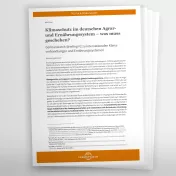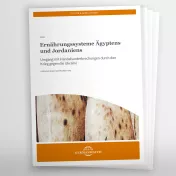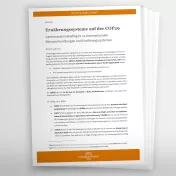| Comments on the Mid-Term Review of the Common Agricultural Policy from a development point of view - Position Paper, as of 26 July 2002 |
The proposals of commissioner Fischler are a consistent updating of the previous reforms in 1992 and 2000. At the same time they imply that payments shall be extensively tied to ecological and social criteria. From our point of view, this is a step in the right direction. From a development point of view, the extent to which the proposals have impacts for developing countries remains to be analysed. There is need for action in the following areas:
- Export of subsidised products and orientation on export
- Market access for DC
- Consequences of higher standards for DC
- Compensation for discriminations of DC (Conversion)
Subsidies/subsidised Exports
1. The main proposal for direct payments is to convert product-specific support (including area payments for cereals and oilseeds and per head payments for cattle) into a single, producer-related income payment per farm, defined from a base year and paid independent of current production. With this de-coupling from production, direct income payments that were hitherto declared under blue box measures in the WTO Agreement on agriculture are converted now into green box measures. From the EU point of view, this is invaluable progress for WTO negotiations, given that the EU is the only country that notifies measures in the blue box, which limits production, but is independent of the amount of production. Due to the impacts of these measures on markets the blue box is strongly criticised by many countries. It could be abolished in the course of the Doha round. With transfer to the green box, EU support measures are much safer from further cutbacks. From a development perspective, this is not desirable for all support measures.
2. Compulsory Cross Compliance asserts adherence to standards in the fields of Environment, food security and animal welfare. In the WTO context, Cross Compliance, as an additional environmental requirement, runs the risk of being understood as coupled to production and thus does not compete with the charge of de-coupling (that means that payments are referred to blue box). The Agriculture Directorate General of the European Commission does not recognise this danger. On the other hand, the interpretation of such programmes as Agricultural environmental programmes does not help either, as payments are then not allowed to exceed additional costs. Incentives for environmentally friendly action are therefore only possible in a rather indirect way - by sanctions.
3. Another important instrument in the proposals is the modulation of payments, with a strong shift to the "second pillar". The enhancement of the "second pillar" of agricultural policy, the enhancement of rural development, becomes authoritative for all and means an additional shift towards the support of sustainable agriculture and the fortification of the numerous functions of agriculture and rural areas. It means a de facto withdrawal from the export orientation of the EU. The "second pillar" is unambiguous about green box measures, albeit not all measures, including some of the new ones, are explicitly mentioned there.
4. Broadly sprinkling subsidies over the whole agricultural sector creates the danger of indirectly subsidising exports of products that have so fare not been significant in exports by assisting farmers, who then turn away from conventionally producing surpluses to remunerative new products, whereby they can supply under production costs, as their basis coverage comes from public sources. The risk of competing with unsubsidised farmers from DC is especially high in fruits and vegetables and processed products. These problems cannot be addressed with conventional trade policy instruments. Thus we demand EU monitoring, statistical records of national average producing costs and their span for all agricultural products so that products exported below production costs can be identified. From a farmer's viewpoint, "average" production costs cannot be the yardstick. Instead, with flexible ceilings and binding to the agricultural work force (certainly not enough yet in Fischler's proposals), differentiation is at the stake, so that rationalisation will not be profitable due to premiums.
5. DC will benefit moderately from further reductions of export subsidies - an indirect consequence of surplus-reduction and price cuts for crops in market regulation regimes. Surplus-reduction will raise mainly due to declining prices, decoupling of income payments and various support measures for diversification inside and outside of the agricultural sector in the framework of the "second pillar". However, advantages for DC from the cuts in export subsidies are contrasted by the trend towards indirect export subsidies. These have hitherto not been listed under "export competition" in the WTO negotiations. Because of the subsidisation of European agriculture, highly modernised farms, getting the biggest part of direct payments (20 % of farms get 80% of payments), can export agricultural products below production costs. This should be prevented by adequate measures like export tariffs.
6. In the transitional period, until the repeal of all export subsidies, the EU should enter into a voluntary commitment of not granting export subsidies for products competing with small-scale farms in DC and introducing the Prior Informed Consent- Principle.
7. The EU carried out a "Sustainable Impact Assessment" in the framework of the WTO negations; this should be effectively carried out regarding the impacts of the CAP.
Market access
8. Here there were no new commitments. The formulation in the cereals market provision that, due to emerging problems, the EU wants a "simplification and change" in its border protection, confirms fears that, in contrast we can expect a number of new trade barriers for new importers (particularly the Ukraine and Russia, with rice especially India, with their non-secured preferences for favoured market access with Basmati rice).
9. The proposals do not include shifts with some products, that are most important for DC, like sugar, olive oil, milk, cotton, sheep meat, tabacco, fruits and vegetables. Here, some corrections, also with a view to involvement of the DC, are urgent and necessary, as commissioner Fischler has already announced. DC should be consulted on this issue.
10. For products from fair trade and bioproducts, tariff- and quota-free market access should be granted.
Standards
11. It is an open and for DC most serious question how new standards as well as systems of certification, audits, transparency and retraceability with the objectives of food security, geographical indication, environmental protection, animal welfare, employment security, etc, will be applied on imports and what impacts they will have. Here, the risk remains for developing countries to be excluded from European markets because of noncompliance with standards. Agricultural policy should not only support EU farmers in maintaining quality and foodsecurity standards, as Fischler proposes, but must also help farmers and processing industries in DC with these issues.
12. Setting of standards has to be multilateral and with strong participation of consumer association from the North and the South and DC's governments. All SPS measures should be arranged in a way that they do not distort trade with DC. For this purpose it is necessary to advance transparency, to inform DC at an early stage and to enter (especially with ACP countries) into a consultative process about the possible direct and indirect consequences and the resulting necessary measures.
13. In parallel with the introduction of national certification measures, the EU should always set rules about non bureaucratic, international comprehensible certification. This must include the recognition of national boards of control. The EU must create transparent rules and procedures when recognising food security systems and certifications abroad and take surveys as a pre-condition of recognition immediately after applying, preferably by independent, international survey teams.
14. The EU should create a clearing centre which all exporters from DC can contact to get accurate information about technical conditions of import and to apply for technical assistance; this centre should also carry out TRTA (Trade Related Technical Assistance) in the agricultural sector. It can also be a contact point for complaints about discriminating practises in the handling of standards in the agricultural sector. DC should be given the right to start a consultative process to discuss difficulties in the adherence and conduct of technical standards with the EU and to find a common solution.
15. The funds for TRTA in the EU administration, as well as in member states, should be increased extensively, as with higher standards we are introducing new trade barriers. This increase should be put in relation in volume to national supports for structural adjustment and certification of national producers.
Conversion
16. Deficiencies in receipts for producers in ACP-countries as result of the price cuts in the EU proposed by Fischler should be compensated, as is planned for European farmers. This especially affects bovine meat exporters in sub-Saharan Africa
17. We propose to put a part of the agricultural subsidies, that have to be reduced in the course of enlargement to the east and in connection with WTO negotiations, into funds to support sustainable agriculture and rural development (SARD) and for the enhancement of food security world-wide (conversion of agricultural policy). Additionally, subsidies should be reduced and reallocated in every case of damage in the areas of environment and development. The com- mitments of the World Food Summit to halve the number of the undernourished by 2015, mean - besides commitments DC have to take - a more significant financial effort than what the EU agreed in the Monterrey Conference on Financing for Development. The FAO proposes a "Global Anti-Hunger Programme" that shall be funded with 24 billion US$.
Imprint
Publishers:
- German NGO Forum Environment & Development, Am Michaelshof 8-10, 53177 Bonn, Tel.: 0228-359704, Fax: 0228-92399356, E-Mail: info@forumue.de, www.forumue.de
- Germanwatch, Kaiserstr. 201, 53113 Bonn, Tel.: 0228-6049215, Fax: 0228- 6049219, E-Mail: germanwatch@germanwatch.org, www.germanwatch.org


